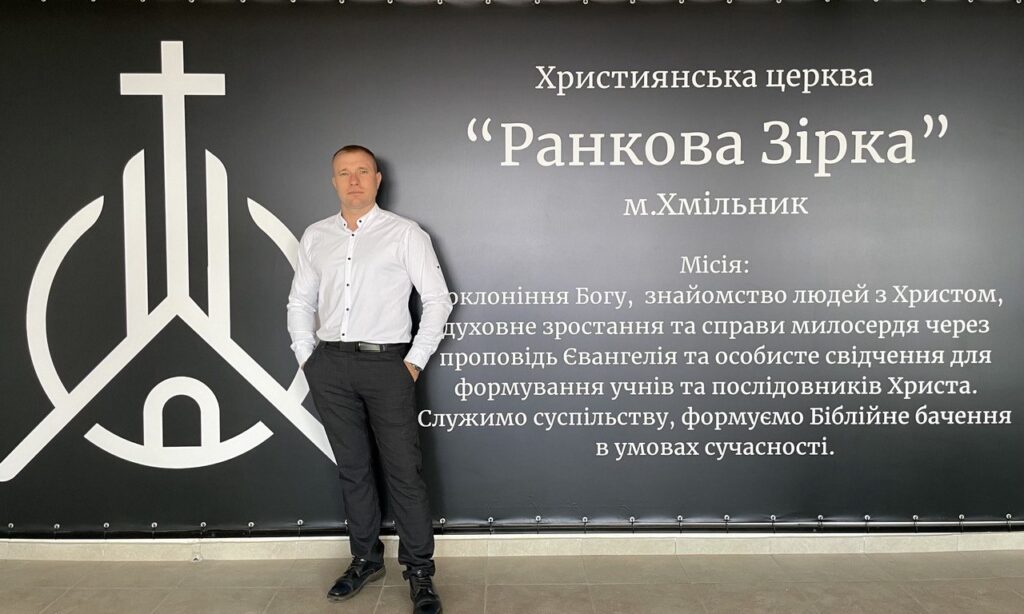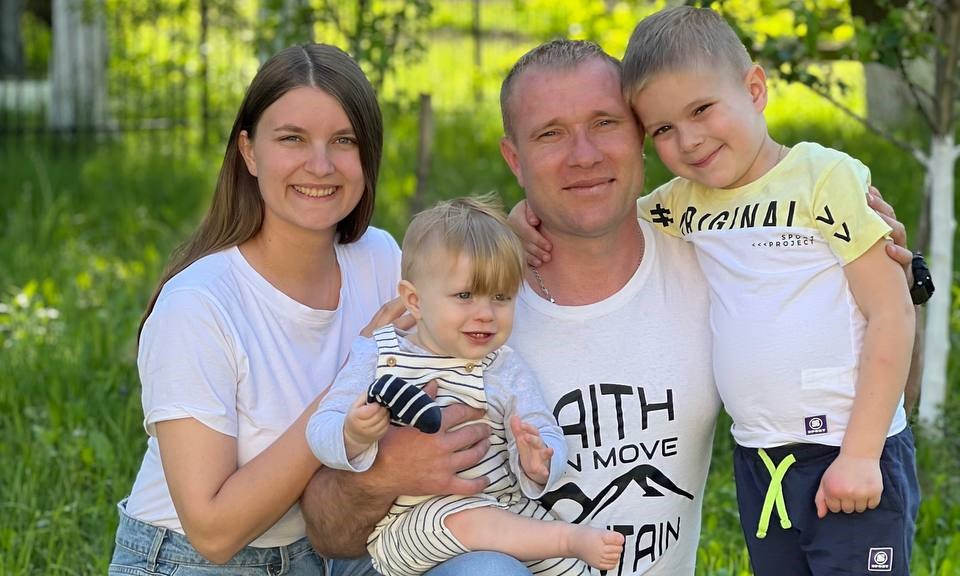

An interview with Kostiantyn Nekrasa, a student of the Applied Theology Program, pastor and army chaplain.
My name is Kostiantyn, and I am 35 years old. I was born in Kaniv, a city in the Cherkasy region, but, for the past 10 years, I have lived in Khmilnyk, Vinnytsia region. I serve as a pastor at the Morning Star Church, which is part of a larger church union in Ukraine. I was ordained for pastoral ministry just a year before Russia’s full-scale invasion of Ukraine.
In addition to my pastoral duties, I am the lead chaplain for the Vinnytsia Regional Police Department and volunteer as a chaplain for a military brigade on the front lines.
I have a wonderful family—my wife and two sons. My journey with the Lord began in 2013 when I became a follower of Christ and was baptized. I soon became involved in various ministries, including helping at a rehab center. Although I initially doubted my ability to make a difference, God has used me in remarkable ways. Many of my friends and relatives have come to Christ through my ministry.
The full-scale war has profoundly impacted every aspect of our lives, including my own. However, it has also strengthened us in many ways, fortifying both our church and our faith. Despite the huge challenges, we have grown stronger. When many church ministers and members left at the start of the war, there were significant gaps in ministry that needed to be filled. My family and I chose to stay in Ukraine and continue serving in every way possible.
As a church, we began focusing more actively on social ministry, serving not just our local community but extending our efforts regionally and eventually throughout Ukraine. We continue to support internally displaced persons (IDPs) and those in need by providing housing, food, clothing, and other necessities. We also minister to military families, particularly those who have lost their loved ones in the war. The war has not changed our theology; it has made us stronger.
My chaplaincy began as we recognized the importance of serving those in the military who are defending our country. Many of my friends and relatives have served in the military since 2014. I initially started visiting military brigades as a volunteer with my uncle, who was serving in the army. Sadly, my uncle passed away last year while defending our country. Despite this loss, I felt compelled to continue visiting soldiers, as I saw the immense need for emotional and spiritual support. To better equip myself, I began studying at the seminary to enhance my ability to help.
As Russia’s invasion intensified, our ministry adapted to meet the evolving needs of the soldiers. We now focus on serving smaller groups directly on the front lines. By working alongside them—whether trenching or cooking—we provide not just pastoral care but also practical support. This hands-on approach allows us to build deeper connections and offer more meaningful ministry.
Scripture encourages us to grow in knowledge, as we see in 1 Timothy 4:16: “Pay close attention to yourself and to your teaching; continue in these things, for in doing this you will save both yourself and your hearers.” I learned about UETS from my pastors, who had studied there, and I decided to enroll.
The seminary experience was transformative for me. It greatly expanded my understanding, as if all the pieces of a puzzle finally came together. The insights I gained from the seminary teachers and the history of the church have profoundly shaped and matured me. I deeply appreciated the dedication of the seminary teachers, who not only taught us during sessions but also spent their free time with us—talking, sharing meals, and walking with us. Their commitment went beyond the classroom; they shared their lives with us.
UETS also revealed new gifts within me. I learned how to preach and overcame doubts I had about my abilities. My sermons have become more holistic and deeper, enabling me to minister more effectively.
Our church is deeply grateful to UETS, not only for its educational ministry but also for its humanitarian outreach. Thanks to the humanitarian support provided by UETS, our church was able to secure a grant, which enabled us to purchase a portion of the building we had been renting. With these funds, we were able to renovate the space, ensuring that our congregation now has heating during services in the winter. This has been a tremendous blessing to our church community.
There are many encouraging stories from our ministry. In 2023 alone, 15 people were baptized in our church, and four of them are now serving full-time in the ministry. I’m also blessed that my older brother joined the church after I shared my faith with him. He had a rough path—he served as a marine, struggled with drug addiction, and had legal troubles. Despite his efforts to change, he often found himself back at square one, losing what he had achieved. But through a life filled with God and dedicated ministry, he experienced a profound transformation.
Another story close to my heart is that of a good friend. He had a large family, but after a divorce, he was left alone with the children. Through my ministry of soul care, he joined the church and accepted the Lord into his heart. Since then, he has been a devoted father to his children and also carer of his elderly parents.
One of the most recent stories involves a commander of a brigade at the front line who contacted me, expressing the need for soul care among his soldiers. Many of them were struggling with alcohol addiction, insomnia, PTSD, and other issues. He asked us to visit the entire brigade to provide support. I am deeply moved by the story of a particular soldier, an elderly man, Ivan, who was a tank driver and had a leadership role, had fallen into severe alcoholism after the traumatic experiences he had endured. He became unable to perform his duties and lost motivation. However, after we began visiting and speaking with him, he underwent a great transformation. He regained his motivation, stopped drinking, and returned to his leadership role. Ivan now sets an example for others, and he often jokes, “My tank is a temple; no one may drink or swear inside.” We stay in close contact, and whenever I visit the front lines, we study the Word and pray together.

